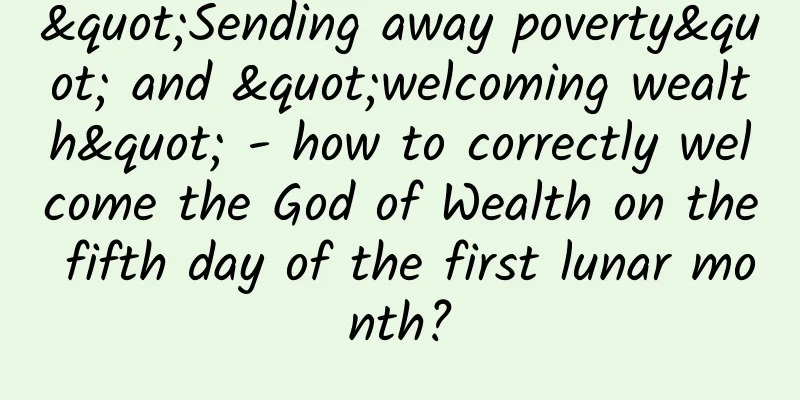"Sending away poverty" and "welcoming wealth" - how to correctly welcome the God of Wealth on the fifth day of the first lunar month?

|
The fifth day of the first lunar month is an important time node during the Spring Festival. "The east wind blows and the fifth day breaks the fifth day" (Su Shi's "Dielianhua: Release fish on Tongan's birthday, take the Golden Light Sutra to save fish") The fifth day of the first lunar month is commonly known as "breaking the fifth day", which means that all taboos during the Spring Festival are broken on this day. In the hearts of Chinese people, the Spring Festival carries too many hopes and aspirations, so there are many taboos during the Spring Festival, and these taboos can only end on the fifth day of the first lunar month. In Beijing during the Qing Dynasty, people could not cook raw rice before the fifth day of the first lunar month, and women could not go out until the sixth day of the first lunar month to celebrate, newlyweds returned to their parents' homes, and shops opened. 0 1 “Send away poverty” "Sending away poverty" on the fifth day of the first lunar month is a very distinctive seasonal custom in traditional society. The Tang Dynasty poet Yao He wrote in "Sending away poverty on the dark day": "Every year on this day, people pour wine and worship in the streets. Every household looks on, and everyone sends away poverty." Why do we need to “send away poverty”? According to legend, when Jiang Ziya was conferring the title of God of Poverty, he named his wife the "God of Poverty" and ordered her to "return home after seeing the broken sky". During the Spring Festival, people would paste Spring Festival couplets with the Chinese character "Fu" on their doors to prevent the "God of Poverty" from entering their homes. They also called the fifth day of the first lunar month "Po Wu" to force the "God of Poverty" to return to heaven early and stop causing trouble on earth. When will poverty be sent away? Nowadays, people usually send away poverty on the fifth day of the first lunar month, but in some places, they send away poverty on the third, twenty-ninth or thirtieth day. For example, in the Jingchu Sui Shi Ji written by Zong Yan of the Liang Dynasty, it is recorded that people send away poverty on the last day of the first lunar month (the twenty-ninth or thirtieth day). How to “send away poverty”? As early as the Tang and Song dynasties, the custom of "sending away poverty" was very popular. This custom was recorded in many literary works, and the most famous one was Han Yu's "Sending Away Poverty". Han Yu used the dialogue between the "master" and the "poor ghost" to express his poverty in wisdom, learning, literature, life, and relationships for more than 40 years, and begged the "five poor ghosts" to leave. Han Yu said in "Sending Away Poverty" that "willows are tied to make carts, grass is tied to make boats, and rice and rice are loaded; oxen are tied under the yoke, and the sails are pulled up on the masts." In order to send away the poor ghost, people used willows to make carts, grass to make boats, loaded with dry food, and then used oxen to pull them to the riverside, invited the "poor ghost" on the boat, and sent him far away, hoping that he would never come back. The ritual of "sending away poverty" varies from place to place. In some places, a woman is made of paper and she carries a paper bag on her back. She is called "the clear-sweeping lady", "the five poor ladies" or "the five poor ladies". People put all kinds of garbage accumulated in the house during the Spring Festival into the bag and send it outside the door together. Then they use firecrackers to explode to send away the poor ghost. 0 2 "Getting Wealth" Folk song: Light a stick of incense on the fifth day of the first lunar month, and you will have abundant wealth all year round; touch gold ingots on the fifth day of the first lunar month, and you will have no money to spend; invite the God of Wealth on the fifth day of the first lunar month, and every household will have abundant wealth; on the fifth day of the first lunar month, the God of Wealth comes to your home, and the harvest will be abundant and the family will be blessed. For business people, the fifth day of the first lunar month is very important. According to traditional customs, shops are closed during the Spring Festival and reopen after the fifth day. In order to pray for a prosperous business, people offer sacrifices, set off firecrackers, burn incense and pray to the God of Wealth to bless them with good fortune and a smooth life for the whole year. The worship of the God of Wealth has to be done early. Some people even start the worship on the evening of the fourth day of the Lunar New Year. "Pray for wealth on the fifth day, and a year's wish will be fulfilled at once; beware of other places welcoming the God of Wealth too early, and rush to welcome the God of Wealth the night before." "Welcome the God of Wealth" means "welcome the God of Wealth." According to folklore, sheep heads and carp are offered to the God of Wealth. "Sheep" and "auspicious" are homophones, implying auspiciousness and beauty, and "fish" and "surplus" are homophones, meaning "surplus every year." How many "Gods of Wealth" are there? There are four civil gods of wealth: God of Wealth, God of War, and God of Five Wealths. There are four civil gods of wealth: God of Wealth, God of Fortune, God of Longevity, Bigan, and Fan Li. The military gods of wealth are the black-faced Zhao Gong and the red-faced Guan Yu. The Five Gods of Wealth are the most chivalrous gods. According to legend, they are five brothers from the same family. They were originally thieves who robbed the rich and gave to the poor. After their death, they often appeared to protect the poor. Because their surname was Wu and they were five brothers, people respected them as the "Five Gods of Wealth". When the fifth day of the lunar calendar arrives, all taboos are lifted and Spring Festival activities are drawing to a close. People from all over the country come together to "send away poverty" and "welcome wealth", hoping to bid farewell to the old and usher in the new, bid farewell to the poverty and hardship of the past, and look forward to a prosperous and healthy new year. END Author: Shao Fengli, Associate Professor, College of Literature, Liaoning University Editor: Guru |
<<: "Meteors" and "spacecraft", the brave ones flying through the air
Recommend
How to make the African kids' happy birthday video?
Today, editor Feng Chao will explain to you how t...
Klein Blue, a popular color in the fashion world for 60 years
Blue is the most essential color of the universe....
On the eve of 315, here’s a super detailed PR guide for you!
"Planning is the key to success, while lack ...
The display forms and monetization of online alliance promotion!
An online alliance is a group of websites and sel...
“The bigger the waves, the more fish there are”? However, the danger is even greater! 丨 Expo Daily
“The bigger the wind and waves, the more fish the...
Let’s talk about how to cleverly deal with iOS keyboard problems?
Preface Students who have written mobile applicat...
The world's first living reproductive robot is born: AI participated in the design and has reproduced for 4 generations
You may have heard of manufacturing robots, assem...
The college entrance examination is over, don’t do these 6 things to your children!
The intensive college entrance examination is fin...
In order to improve performance, scientists actually "supplement" semiconductors with vitamin C?
Produced by: Science Popularization China Author:...
A complete QQ group marketing promotion plan
A friend of mine who works in the gray industry o...
Zhejiang's Most Scientific | Who says fiber can only be used to make clothes? It can also be used to make bicycles and airplanes!
Do you know how clothes are made? What magical fu...
How are genes passed from parents to children?
When a child is born, people often gather togethe...
Community operation: the key point to keep the community active!
I ate and drank too much in the first half of the...
How to attract traffic to hairy crabs on Zhihu?
Get 5000+ customers at 0 cost, how does Daxiex at...
2 major directions + 5 capabilities + 7 strategies, SEM promotion effect is doubled!
Introduction: The promotion effect is abnormal, t...









